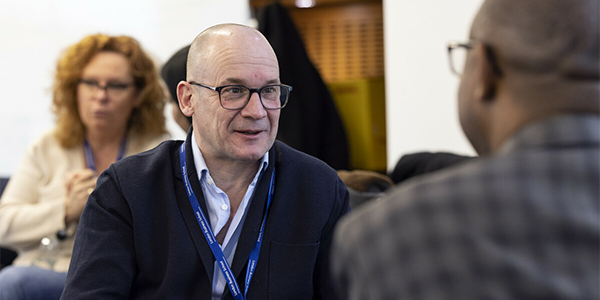
Family Enterprise @ IEPC
Nurturing Legacy. Leading Across Generations.
Successful family enterprises – spanning both family businesses and family offices – are vital to the global economy. In the UK alone, over 5 million family firms employ more than 13 million people. In the Middle East, they generate 60% of GDP and provide over 80% of jobs. These enterprises are defined not just by economic value, but by purpose, legacy, and a commitment to long-term impact.
With our Family Enterprise activities at the Institute of Entrepreneurship and Private Capital (IEPC), we support these multigenerational enterprises through research, teaching, community-building, and peer-led engagement. We recognise the unique challenges family enterprises face as they evolve – balancing innovation with continuity, growth with stewardship.
Our programmes, events, and resources equip both current leaders and next-generation successors to navigate complexity, lead with purpose, and strengthen their legacy across generations.
To be the global learning and convening platform for multigenerational business families and family office professionals committed to long-term impact, stewardship, and legacy.
The activities are led by Rhian-Anwen Hamill, Director and supported by the team at the Institute of Entrepreneurship and Private Capital (IEPC), who run its programmes, events, and operations.

Director, Family Enterprise at the Institute of Entrepreneurship and Private Capital
Experience
Rhian-Anwen Hamill serves as the Director of Family Enterprise at London Business School. She has been a senior advisor to global families for two decades and is a respected speaker, coach, and facilitator at family business events.
Rhian operates internationally with senior individuals and businesses. Her clients include family collectives, private partnerships, FTSE and other listed companies, and some large charities. She has a particular interest in privately owned businesses and writes on a wide range of issues affecting families, including coaching for succession planning, family office recruitment, and women in family enterprise. Her work has been published in Family Capital, Globe Law and Business, and STEP’s Family Office Journals.
She has spent over 30 years immersed in financial and professional services, starting her career at Goldman Sachs, and since 2005, running her leadership advisory, search, and coaching firm, RAH Partners. She has also operated at board/C-Suite level in the world of arts and philanthropy.
Rhian was educated at UWC Atlantic College, Fitzwilliam College - University of Cambridge, the Tavistock Institute, the Kets de Vries Institute, and Meyler Campbell. She is a council member of the Hay Festival of Literature and was a member of the External Affairs Committee of UWC Atlantic College. She has been Chair of The Word, a literature festival in London, and a Member of the Development Appeal at St George’s Chapel, Windsor. She is also the Director of Cool Bananas, a Zambia-based agriculture business.
She lives in West London with her husband, Michael, a barrister and mediator, and her two teenage children, Arthur and Molly.
Connection and Community: We foster a global network of business families, successors, and family offices through curated events and trusted peer-to-peer exchange.
Mentorship and Practical Support: Our Family Enterprise Mentoring Programme pairs experienced family business leaders with students and alumni facing real-world challenges.
Insight and Impact: Through research collaborations and strategic partnerships, we highlight emerging trends in governance, succession, innovation, and long-term value creation.
Learning opportunities: Explore Executive Education programmes, led by the IEPC faculty and our family enterprise supporters, specifically designed for business-owning families, providing practical insights into governance, leadership, and succession.
Educating the executives and next generation of a family enterprise equips them for leadership and ownership to ensure that they become true assets of the business. At London Business School we offer a variety of lifelong learning options, whether through an MBA program to develop individuals into well-rounded executives, or through executive courses and open programs that are more focused. The following is a portfolio of topics available from the School that are most typically relevant to those working in a family business.
MBA Electives
A selection from an inspiring choice of more than 80 electives
In-Person Executive Courses
Short courses of (4-5.5 days) offered at the London Campus.
Online Executive Courses
An immersive learning experience designed and led by world-class faculty.
Executive Programs
Over 100 hours of faculty-led learning and coaching with industry experts.

Building sustainability and preserving legacy. Learn the latest thinking, approaches and skills to manage succession planning, governance and wealth management.
Develop inspiring and practical strategies to serve the needs of ownership, families and their businesses, face-to-face with world-leading academics and practitioners. This course is targeted at families of wealth considering setting up, or in the process of setting up a single family office, and those wanting to identify the best practices for an existing single family office. The programme is exclusively open to family members.
Associate Professor of Strategy and Entrepreneurship Ioannis Ioannou, a leading expert on sustainability, has published new case studies on family businesses, including the Flakk Group, Pentland Brands and Hasslacher Group. These case studies explore sustainable practices within these firms and offer valuable insights into responsible business strategies. Discover more about his latest work and its impact on family businesses.
To find out more about Entrepreneurship and Private Capital at LBS, please email us at the address below.